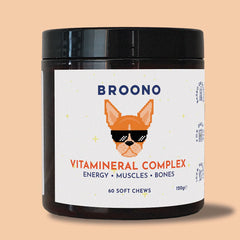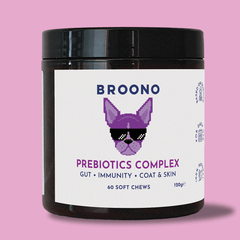
Vitamin E for Dogs
Alpha-Tocopherol
Vitamin E, scientifically known as alpha-tocopherol, is a fat-soluble antioxidant that plays a crucial role in maintaining your dog’s overall health. It is best known for its ability to protect cells from oxidative damage, support skin and coat health, and aid immune function. Unlike water-soluble vitamins, Vitamin E is stored in the body’s fat tissue, making it essential to maintain an adequate but safe level through diet or supplements.
Main Benefits of Vitamin E for Dogs
1. Powerful Antioxidant Protection
Vitamin E is a potent antioxidant that helps neutralise free radicals—unstable molecules that can cause oxidative stress and damage cells. This protection helps slow down the effects of ageing, prevent inflammation, and reduce the risk of chronic diseases such as cancer. Antioxidants like Vitamin E are particularly beneficial for active dogs or those under environmental stress.
2. Supports Immune Function
Vitamin E plays an important role in boosting the immune system. It helps improve the function of immune cells, enabling your dog to better fight off infections and illnesses. By supporting a robust immune response, Vitamin E ensures your dog stays healthy, especially during periods of stress, growth, or recovery.
3. Promotes Skin and Coat Health
Vitamin E is well-known for its benefits to skin and coat health. It helps maintain the integrity of cell membranes and promotes the regeneration of skin cells, keeping your dog’s skin soft, moisturised, and free from dryness or irritation. Additionally, Vitamin E contributes to a shiny, lustrous coat, reducing itching, flakiness, and dandruff.
4. Improves Heart Health
Vitamin E supports cardiovascular health by protecting cells from oxidative damage that can lead to heart disease. It helps improve circulation and maintains the flexibility of blood vessels, ensuring that your dog’s heart functions efficiently, particularly in senior dogs or breeds prone to heart issues.
5. Supports Eye Health
Vitamin E can also protect your dog’s eyes from oxidative damage that may lead to conditions like cataracts or vision loss. By safeguarding the delicate cells in the eyes, Vitamin E helps maintain sharp vision, especially in ageing dogs.
The Role of Vitamin E in Gut Health
Vitamin E supports gut health through its antioxidant properties and its role in maintaining cellular health within the digestive system. Here’s how it contributes:
1. Antioxidant Protection
Vitamin E is a powerful antioxidant, protecting the cells lining the gut from oxidative stress caused by free radicals. This is especially important because the gut is constantly exposed to environmental toxins, food-related oxidative stress, and microbial byproducts. By reducing oxidative damage, Vitamin E helps to maintain the integrity of the gut lining, preventing issues such as leaky gut syndrome.
2. Supports Immune Function in the Gut
Vitamin E plays a role in modulating the immune system, particularly in the gut where much of the body’s immune activity takes place. By reducing inflammation and supporting immune responses, Vitamin E helps maintain a balanced gut environment, which is crucial for proper digestion and nutrient absorption.
3. Enhances Gut Barrier Function
The gut barrier, made up of the epithelial cells lining the intestines, serves as a protective shield against harmful substances. Vitamin E contributes to the maintenance of this barrier, supporting healthy cell membranes and promoting cell repair and regeneration. This helps prevent the penetration of harmful substances into the bloodstream, which could otherwise lead to chronic inflammation or infections.
4. Microbial Balance
Though more research is needed in this area, Vitamin E has been suggested to influence the composition of the gut microbiome by reducing inflammation and oxidative stress, creating a healthier environment for beneficial gut bacteria to thrive. A balanced microbiome is essential for optimal digestion and overall gut health.
5. Promotes Nutrient Absorption
By supporting the overall health of the gut lining and reducing inflammation, Vitamin E indirectly aids in better nutrient absorption, ensuring that your body can efficiently process and utilise the nutrients from food.
Why We Include Vitamin E in Our Supplements
We include Vitamin E (alpha-tocopherol) in our supplements because of its vital role in providing antioxidant protection, immune support, and skin and coat health. Dogs with high energy levels, those exposed to environmental stressors, or those prone to skin issues can benefit from the inclusion of Vitamin E in their diet. Its ability to neutralise free radicals, protect cells, and support overall health makes it an essential nutrient for maintaining your dog’s vitality.
How We Optimise the Dosage of Vitamin E
The dosage of Vitamin E in our supplements is carefully balanced to ensure that your dog gets the right amount for their size, age, and specific health needs. Since Vitamin E is fat-soluble and can accumulate in the body, it’s crucial to provide the correct dosage to avoid over-supplementation. By working with canine nutrition experts, we ensure that your dog receives the optimal level of Vitamin E for antioxidant support, skin health, and immune function.
The Bottom Line
Vitamin E (alpha-tocopherol) is an essential nutrient that provides antioxidant protection, supports immune function, promotes skin and coat health, and helps maintain heart and eye health in dogs. As part of our supplements, Vitamin E helps your dog stay healthy, active, and protected from oxidative damage. Including Vitamin E in your dog’s diet is particularly beneficial for dogs with skin issues, older dogs, and those exposed to stress or environmental pollutants.
Frequent Questions
1. How can I tell if my dog needs more Vitamin E?
Signs of Vitamin E deficiency in dogs may include dry skin, a dull coat, muscle weakness, and a weakened immune system. If you notice these signs, consult your veterinarian to determine whether Vitamin E supplementation could be beneficial.
2. Can my dog have too much Vitamin E?
Yes, because Vitamin E is fat-soluble, excessive amounts can build up in the body and may lead to toxicity over time. Symptoms of Vitamin E toxicity can include gastrointestinal issues, lethargy, and in severe cases, bleeding disorders. It’s essential to follow the recommended dosage to avoid these risks.
3. Is Vitamin E beneficial for dogs with skin issues?
Yes, Vitamin E is especially beneficial for dogs with skin conditions, as it helps repair and regenerate damaged skin cells, reduces inflammation, and promotes overall skin and coat health.
Vitamin E
contained in


